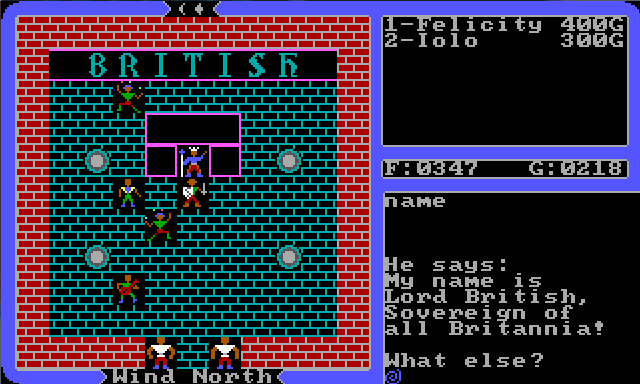Released: Sep 16, 1985
Version played: DOS (1987)
I’m going to keep it real with you, I did not finish Ultima IV. I didn’t finish Ultimas I through III either, though I sampled them a little just for context. It didn’t seem worth writing about any up til now though, and I stuck with this one for much, much longer, because the seeds of something beautiful begin to sprout here.
Ultima is like the total opposite of Wizardry in that Wizardry is perfect in an almost elemental sense. There’s nothing that needed to be added or removed. Wizardry is Wizardry and you can go on steam right now and buy a ten, fifty a hundred games that are still pretty much just Wizardry. Nothing is like Ultima.
Richard Garriot’s ambition with these games so far outstrips the capability of the hardware at the time that the sheer fact that these even shipped is an absolute miracle. Ultima IV has a fully developed world full of named NPCs, a (less intense but still present) hunger and survival system, an entirely naturally occuring form of fast travel that requires understanding of the phases of the moon to decode, full party control in grid based combat, a vast bespoke open world replete with towns, shrines and dungeons, different forms of terrain that affect your navigation – and so on, and so forth, you get the idea. And I didn’t even mention the morality system that is the game’s entire raison d’etre.
It’s utterly overwhelming. This game released the same year as Super Mario and Gradius. No wonder that to a certain type of kid this game was utterly life changing, it must have seemed like the absolute coolest work of art, utterly blowing open the possibilities of a scene that truly hadn’t exited the bleeps and bloops era yet in the cultural consciousness.
And yet, as I pushed further and further into Ultima IV the true heart of its brilliance was none of that. Ultimately its systemic complexity was a massive timesink attached to the real star of the show, the dialogue system and quest design. Talking to NPCs, figuring out keywords, understanding how information from one NPC could give new context in another conversation, the way all these different – and ultimately extremely simple – prompts interlocked to provide a true and genuine sense of discovery was constantly enthralling. The actual bulk of the video game of Ultima IV, the exploration and combat, is this strange mix of far too simple and far too complex that it simultaneously overwhelms and bores me, but when take a route you heard about in town and find the pass to reach a new destination, and ask the innkeeper about the rumour you heard three towns over – the guy said ask around town – and the game responds back to your intuition with the next piece of the puzzle; it’s genuinely electric.
But it’s also extremely funny to walk away from the most ambitious and complex game of 1985 going yeah this would have been better as a pure text adventure.
One note before moving on: the story here is pretty good finally. I did not like the stories of Ultima I-III, if they can be called such things. But the juxtaposition of self serious fantasy with juvenille reference humour just isn’t my bag at all. I get why the games start like that, they are the passion projects of a literal teenage nerd making goofy games for other teenage nerds, and it certainly is more than a little silly to five years in suddenly say that Lord British, a stupid joke username you go by, is testing you to philosophically ponder the path to true virtue and enlightenment, but the more consistently sincere (yet still lighthearted and whimsical) tone is one that befits the adventure better.
Interestingly enough this is not a contradiction that has ever gone away. They are spending perhaps billions of dollars to make the new Grand Theft Auto, the most realistic simulated recreation of American Urbanism that money can bye, crafted by a global army of artists working tirelessly for the better part of a decade and also the beer is still going to be called Pißwasser. Perhaps the only conclusion to draw from all this is despite the rapidly changing conditions of the medium’s production there is one constant that remains tragically true; games are usually made by gamers.

